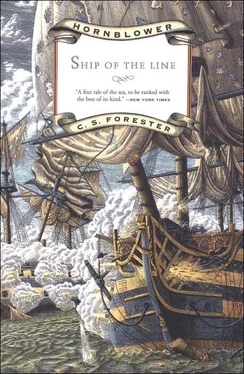It was fortunate this time that Leighton had been Rear-Admiral of the Red, so that the Sutherland had worn his colours. What was more, the Sutherland had the round bow given her by her Dutch builders, the same as nearly every French ship of the line, and unlike every English ship save three or four. So the brig had taken the Sutherland to be French, and as soon as she was sure of this had held to the wind again, anxious to make her offing so as to weather Cape Creux. Then the MV signal which she had flown had been the private French recognition signal—that was something well worth knowing. It was only when the Sutherland did not make the expected conventional reply that the French captain had realised his mistake, and made one last dash for liberty.
A quite unavailing dash, for the Sutherland had cut her off from all chance of escape to leeward. The ships were only two miles apart now, and converging. Once more the brig came round, this time with the very faint hope of clawing away out of range to windward. But the Sutherland was hurtling close upon her.
“Fire a shot near him,” snapped Hornblower.
At that threat the French captain yielded. The brig hove to, and the tricolour came down from her peak. A cheer went up from the Sutherland’s main deck.
“Silence, there!” roared Hornblower. “Mr. Bush, take a boat and board her. Mr. Clarke, you’re prize-master. Take six hands with you and navigate her to Port Mahon.”
Bush was all smiles on his return.
“Brig Amelie, sir. Six days out from Marseilles for Barcelona. General cargo of military stores. Twenty-five tons powder. One hundred and twenty-five tons of biscuit. Beef and pork in casks. Brandy. Admiralty agent at Port Mahon’ll buy her, sure as a gun, ship, stores, and all.” Bush rubbed his hands. “And we the only ship in sight!”
If any other British ship had been in sight she would have shared the prize money. As it was the only shares to be given away were those of the Admiral commanding in the Mediterranean and of Admiral Leighton commanding the squadron. Between them they would have one-third of the value, so that Hornblower’s share would be about two-ninths—several hundred pounds at least.
“Bring the ship before the wind,” said Hornblower. Not for worlds would he give any sign of his delight at being several hundred pounds richer. “We’ve no time to lose.”
He went below to shave, and as he scraped the lather from his cheeks and contemplated the melancholy face in the glass he meditated once more on the superiority of sea over land. The Amelie was a small vessel, almost inconsiderable in size. But she carried between two and three hundred tons of stores; and if the French had tried to send that amount overland to Barcelona it would have called for a first-class military convoy—a hundred or more waggons, hundreds of horses, taking up a mile or more of road and needing a guard of thousands of troops to protect it from the attacks of the Spanish partisans. Troops and horses would have needed food, too, and that would call for more waggons still, all crawling along at fifteen miles a day at most over the Spanish roads. Small wonder, then, that the French preferred to run the risk of sending their stores by sea. And what a blow it would be for the harassed French army to find a British squadron on their flank, and their best route of communication broken.
Walking forward to take his bath with Polwheal in attendance, a new idea struck him.
“Pass the word for the sailmaker,” he said.
Potter the sailmaker came aft and stood at attention while Hornblower rotated himself under the jet of the washdeck pump.
“I want a French ensign, Potter,” said Hornblower. “There’s not one on board?”
“French ensign, sir? No, sir.”
“Then make one. I’ll give you twenty minutes, Potter.”
Hornblower continued to rotate under the jet of the pump, rejoicing in its refreshing impact on this hot morning. The chances were that no Frenchman had observed the capture of the Amelie from Cape Creux, and that was the only land in sight at the time. Even if someone had done so, it would take many hours to warn all the coast line of the presence of a British ship of the line. Having taken the French by surprise, the right game to play was to go on exploiting that surprise to the utmost, making use of every device that would make the blow effective. He went back to his cabin and put on refreshing clean linen, still turning over in his mind the details of his plans which were now losing their nebulousness of the night before and growing more and more clear cut.
“Breakfast, sir?” asked Polwheal, tentatively.
“Bring me some coffee on the quarterdeck,” said Hornblower. He could not bear the thought of food—perhaps because of his present excitement, perhaps because of his vast dinner of the night before.
From the quarterdeck could be seen shadowy blue masses on the horizon right ahead—the peaks of the Pyrenees; between them and the sea crawled the road from France to Spain. The sailmaker’s mate came running aft with his arms full of a vast bundle.
“Mr. Vincent,” said Hornblower. “I’ll have this flag hoisted instead of our own.”
The officers of the quarterdeck eyed the strange tricolour as it rose to the peak, and they looked from the flag to their captain, whispering among themselves. Grouped on the lee side, not one of them dared to try to open a conversation with Hornblower on the weather side. Hornblower exulted both in their excitement and their silence.
“Send the hands to quarters as soon as they have breakfasted, Mr. Bush,” said Hornblower. “Clear for action, but keep the ports shut, I want the long boat and launch ready to be hoisted out at a moment’s notice.”
The hands came tumbling up from breakfast in a perfect babble of sound—the order to clear for action, the tricolour at the peak, the mountains of Spain ahead, the morning’s capture, all combining to work them up into wild excitement.
“Keep those men silent on the maindeck, there!” bellowed Hornblower. “It sounds like Bedlam turned loose.”
The noise dwindled abruptly, the men creeping about like children in a house with an irascible father. The bulkheads came down, the galley fire was tipped overside. The boys were running up with powder for the guns; the shot garlands between the guns were filled with the black iron spheres ready for instant use.
“Cleared for action, sir,” said Bush.
“H-h’m,” said Hornblower. “Captain Morris, if I send away the long boat and launch, I want twenty marines in each. Have your men told off ready.”
Hornblower took his glass and studied once more the rapidly nearing coast line. There were cliffs there, and the coast road wound at the foot of them, at the water’s edge, and the shore was steep-to, according to his charts. But it would be a sensible precaution to start the lead going soon. He was taking a risk in approaching a lee shore guarded by heavy batteries—the Sutherland might be badly knocked about before she could beat to windward out of range again. Hornblower was counting not merely on the disguise he had adopted, but on the very fact that the French would not believe that an English ship could take that risk.
To the French in the batteries the presence of a French ship of the line off that coast was susceptible of explanation—she might have ventured forth from Toulon, or have come in from the Atlantic, or she might be a refugee from some Ionian island attacked by the British, seeking refuge after long wanderings. He could not believe that they would open fire without allowing time for explanation.
At a word from Hornblower the Sutherland turned on a course parallel with the shore, heading northward with the wind abeam. She was creeping along now, in the light breeze, only just out of gunshot of the shore. The sun was blazing down upon them, the crew standing silently at their stations, the officers grouped on the quarterdeck, Hornblower with the sweat running down his face, sweeping the coast with his glass in search of an objective. The little wind was calling forth only the faintest piping from the rigging; the rattle of the blocks to the gentle roll of the ship sounded unnaturally loud in the silence as did the monotonous calling of the man at the lead. Suddenly Savage hailed from the foretop.
Читать дальше









